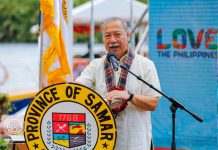Massive vote-buying marked the brgy, SK polls
CALBAYOG CITY- Vote-buying during election times has become a ‘hallmark’ of sort in the country to the extent that voters no longer mind what candidates would do if they win but rather how much they would shell out just to get elected.
And the recently-concluded barangay and Sangguniang Kabataan (SK) elections was not an exception as massive vote-buying was reported in this city and the rest of Samar province as voters were eager to ensure that they were included in the ‘budget lists’ by the candidates.
‘Baby,’ a voter of an island-town and asked not to be named, said that she recieved P4,000 during the elections from various candidates in their village.
“I vote (d) for barangay and SK so the budget for me was double,” the 21-year old said.
Those who are 18 years old up to 30 years of age casted both for the regular barangay and youth elections.
Baby said that in their town, a voter received a minimum of P2,000 to vote for a punong barangay, at least P1,500 for a SK chairman and a minimum of P100 each for barangay and SK councilor.
According to her, she received P1,000 as an initial ‘payment’ with the remaining P3,000 after she casted her votes.
“Our family no longer believe on their promises because these will not come true and will just remain as promises,” she said reason why they prefer money than listening to the candidates’ plans if they get elected.
In fact, it’s how much that they could receive during elections and not the platforms of the candidates that dominate their conversations, she said.
In 2016, the first time she voted, Baby earned more than P5,000, a big amount for those who have no steady source of income.
“Whoever is the highest bidder I will vote because election is all about money,” she said.
Baby admitted that for the past years even before she voted, her understanding about elections is giving of money.
Another voter, “Sarah” from this city who also declined to give her name, hoped for peace and more development for their village though she was willing to sale her vote.
“I made sure that my name and the other members of our family were included in the list asked by the candidates,” she said.
With the massive vote-buying that marked the conduct of the May 14 elections in the region, amounting as high as P5, 000 per voter, the appeal issued by the Commission on Elections and the Catholic Church obviously fell to deaf ears. (JENNIFER SUMAGANG-ALLEGADO)



